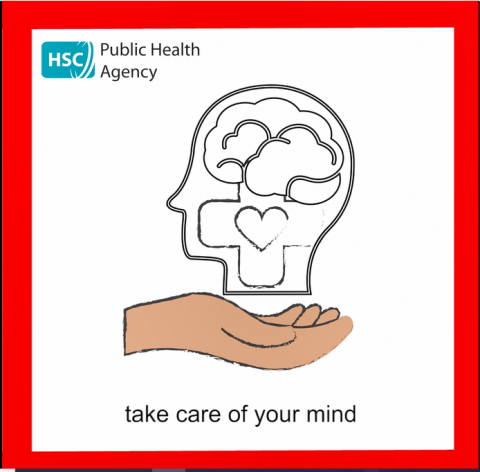Essential to look after wellbeing while staying at home

The Public Health Agency (PHA) is highlighting how important it is for people to look after their wellbeing as they stay at home to help stop the spread of coronavirus (COVID-19).
Professor Hugo van Woerden, Director of Public Health and Medical Director at the PHA, said: “Coronavirus, and the impact it is having on our normal way of life, is understandably going to affect people’s emotional and physical wellbeing – concern about the virus and illness it may cause and the effects of staying at home for a prolonged period, will be affecting people’s wellbeing. However, it’s important to remember you are not alone, many others will be feeling the same, experiencing frustration, worry or loneliness. So we are encouraging everyone to take care of their mind as well as their body and to get support if they need it.
“Take 5 steps to wellbeing’ is a good practical framework for people to cope at home during these difficult times. We will be adding additional support tools for people in the coming days/weeks.
“Connect with the people around you. Keep in touch with family, friends, colleagues or neighbours through calls, text or video links like FaceTime, WhatsApp, or Skype. ‘Zoom group chats’ are proving really helpful for people in the current environment. Arrange a recurring time to call, and this will be something to look forward to and help get some routine into your day and week.
“Think about things you can do during your time at home, to learn or improve on a skill. Try cooking, reading, online learning and watching films. For example, you could agree with friends and family what you are going to watch or read and perhaps arrange a call to chat about what you thought about it. Learning new things gives us a sense of achievement, increased confidence and enjoyment. Use this perhaps as an opportunity to also teach your children or grandchildren new skills.
“If you feel well enough, you can take part in light exercise within your home or garden. Exercising makes us feel good both mentally and physically. Gardening or housework count as physical activity. Maybe try an online exercise video. The NHS website www.pha.site/workout has a range of options, or there are a number of fun videos available free on YouTube, for all ages and different levels of ability.
“Don’t be afraid to use the ‘downtime’ to pause. Reduce your time watching the news and browsing social media. Let go of what none of us can control right now and focus on what you can control. Acknowledge your thoughts and feelings and be kind to yourself. It is normal not to feel ‘normal’ during this time.
“Listen to gentle music or try relaxation apps and videos. Know that this is temporary and things will get better. It can be easy to fall into unhealthy patterns of behaviour that end up making you feel worse, try to avoid smoking, and try not to drink too much alcohol.
“People find it helpful to remind themselves why staying at home is so important right now. We are saving lives by doing so. We know some people are badly affected by COVID-19, particularly the elderly and those with underlying health conditions. By staying home, you are protecting the lives of others, as well as making sure the NHS does not get overwhelmed.”
“We will get through this together, there are brighter days ahead so please take care of yourself and others around you”.
For more tips on how to Take 5 steps to wellbeing while you stay at home visit www.pha.site/StayAtHome
For further general advice, resources and information on how to take care of your mental health and wellbeing, please visit NI Direct: www.pha.site/nidirect
For a list of over 30 NI helplines offering telephone support and advice on a wide range of issues – visit www.helplinesNI.com
If you are in distress or despair and need to speak to a counsellor immediately, call Lifeline, the 24/7 crisis counselling helpline, on 0808 808 8000
